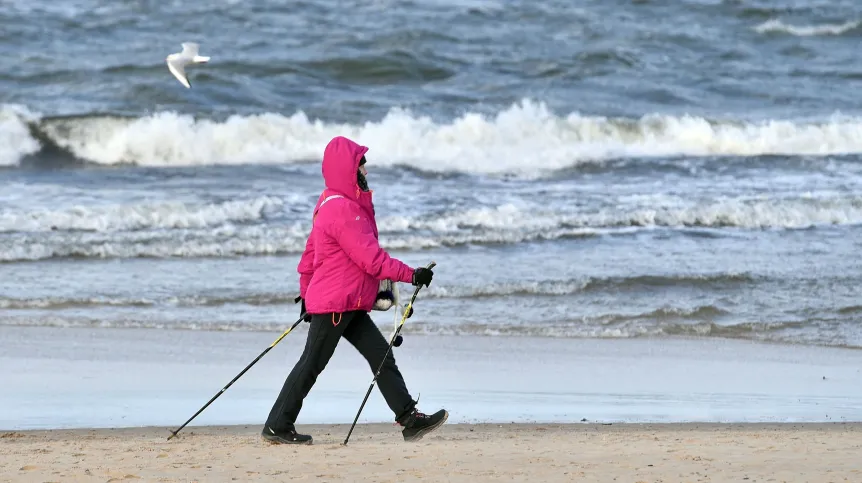
The end of life awaits us all, the only question is the condition we will be in and when it will happen. Some scientists consider the 120th year of life to be the limit, perhaps it will be possible to move it even further, says Judyta Samul-Jastrzębska, an internist and geriatrician.
On Senior Day, PAP talks to Judyta Samul-Jastrzębska, an internist and geriatrician. In her opinion, it is possible to prepare for aging in such a way that you can live to be at least 120 years old in good condition. However, as the expert points out, it is not our birth certificate that shows our age, but how we feel and how active we are.
PAP: When does a person become a senior?
Judyta Samul-Jastrzębska: The official definition of the World Health Organization sets the starting point for old age at 60 years, although many people at that age could be offended because they do not yet feel like seniors. However, in my opinion, age should not be defined only by metrics, but above all by well-being, as well as biological age - I think that this is the best measure of old age.
PAP: So what does being a senior consist of, if not age?
J.S.-J.: Precisely this biological age, i.e. how you age, how your organs and cells age. Aging is a very individual matter, because some people at the age of 60 are already heavily burdened with diseases, require the help of their loved ones, and at the same time we have wonderful examples of 80- or even 90-year-olds who function fantastically, they are socially active and do sports, they are in good shape and not sick at all.
PAP: Can a person earn a good old age, i.e. being not that old?
J.S.-J.: Definitely yes, and lifestyle is of fundamental importance. I am a staunch enthusiast of lifestyle medicine, which is based on five pillars, on actions that we can take ourselves. It is the way of eating (but not the diet), physical activity, healthy sleep, interpersonal relationships and avoiding addictions - these are the foundations of maintaining fitness and independence.
PAP: You said 'avoiding addictions', but not all stimulants, I guess?
J.S.-J.: Stimulants too, sorry to disappoint you. The most popular ones are nicotine and alcohol - any amount of them is bad for your health. Small amounts of alcohol used to be considered beneficial for health, but today we know that even these small amounts are not good for your health.
PAP: And what about the way of eating, but not the diet?
J.S.-J.: The way we eat affects what our physical activity will look like. In turn, physical activity affects whether we sleep well, and whether we sleep well - affects whether we eat more or less, because if you have a constant lack of sleep or a lot of stress, you will definitely consume more calories during the day. In the way we eat, we should maintain some flexibility and balance nutrients. The way of eating that dominates in the Mediterranean is considered to be a beneficial one - a lot of leafy vegetables, legumes and fruit plus all kinds of sea creatures (of course, if one is not allergic to them), vegetable fats such as olive oil or rapeseed oil. In today's world, many of us use or look for various supplements, and it is worth emphasizing that natural anti-aging molecules, so-called senolytics, can on our plates, of course if put them there. They include, for example, Quercetin, which is found in red onions, peppers, blueberries and curcumin.
PAP: Let's talk about physical activity - does research show that it also has an impact on mental activity?
J.S.-J.: A study by scientists from University College London, published in the Journal of Neurology, Neurosurgery and Psychiatry, shows that one of the modifiable risk factors for dementia is physical activity. The researchers asked the study participants - 1,400 people, a significant sample - born in 1946, how much they exercised at the ages of 36, 43, 53, 60-64 and 69. It turned out that physical activity at all the mentioned time points was associated with significantly better preservation of cognitive functions at the age of 69, in terms of memory, verbal fluency and information processing speed.
People who did any exercise in adulthood - even once a month - had better preserved cognitive functions in later life compared to physically inactive participants.
Thus, physical activity is the second pillar of lifestyle medicine, i.e. the actions we can take ourselves to age healthily.
It has a beneficial effect not only on our circulatory system, not only does it reduce the risk of developing many lifestyle diseases, such as diabetes, but it also has a beneficial effect on the health of our brain. On the one hand, it improves cerebral blood flow, makes brain cells better nourished, and additionally reduces the risk of atherosclerosis and vascular changes in the brain, and thus reduces the risk of dementia.
Importantly, even if you take up physical activity in the sixth or seventh decade of your life, it will still have a beneficial effect.
PAP: So, pick up your poles!
J.S.-J.: Exactly right, pick up your Nordic walking poles, also because they have a beneficial effect on deep muscles and large muscle groups, they engage not only the muscles of the limbs, but also the abdominal and torso muscles, they are more beneficial than cycling or regular walking, and they are easily accessible.
PAP: One of the first signs of aging that we observe in ourselves is that our skin suddenly becomes less smooth, less taut. Are there any miraculous ways to stop this process?
J.S.-J.: Yes, there are such methods. Again, I mean prevention, but people aged 60 plus or 70 plus can also improve the condition of their skin.
The skin ages in two ways. On the one hand, we are dealing with a natural process related to age, the so-called intrinsic skin ageing, and on the other hand, we are dealing with photoaging, which is responsible for as much as 80 percent of adverse changes - for example, the appearance of wrinkles.
Additionally, UVA and UVB radiation increase the risk of developing cancerous diseases, such as squamous cell carcinoma. UVA radiation penetrates much deeper, to the dermis, and it is the main cause of photoaging. It also increases the risk of developing melanoma. The UVA content in sunlight is much higher than UVB. Both types of radiation increase the risk of developing basal cell carcinoma.
That is why it is worth using appropriate photoprotection. Both young people and seniors should use UV filter creams. Especially during the hottest periods, because although the sun's rays are necessary for the synthesis of vitamin D3, which is very important for the immune system, spending a lot of time in the sun, especially when it is at its zenith, is not beneficial.
PAP: This is another sad piece of news, because many people like to be tanned.
J.S.-J.: Tanning is rather passé these days. Apart from that, you can use a self-tanner, it will be just as nice and healthier.
PAP: Where do various types of warts on the skin of older people come from? Is it a matter of viruses or simply skin aging?
J.S.-J.: There can be many causes. Of course, these can be changes of viral origin, but they can also result from genetic predisposition. Viral changes are more common in older people, among others due to the aging of the immune system. Seborrheic keratosis is more common in people with impaired cellular metabolism, in whom advanced glycation end products (AGEs) accumulate. Advanced glycation end products not only lead to skin aging, but also to the aging of the entire body. Increased production of these molecules is observed in people with diabetes, people who consume large amounts of carbohydrates, people exposed to stress, which promotes the production of cortisol.
It is worth noting that a sudden outbreak of seborrheic keratosis, especially on the skin of the torso, called Leser-Trélat sign, may be an early symptom of colon cancer, so you should not ignore it, you need to go and get tested.
PAP: At what age should one see a geriatrician, if only to jointly establish a strategy for the coming years?
J.S.-J.: According to the National Health Fund, in Poland anyone over 60 can see a geriatrician. A referral from a primary care physician is necessary. Unfortunately, most patients, both due to the shortage of geriatricians and the lack of knowledge of other doctors, see specialists in this field too late, already burdened with numerous diseases. Personally, I dream of every person over 60 seeing a geriatrician- for a preventive visit. Just like a child goes for a preventive check-up - not because they are sick, but to be healthy. In this context, it is also worth mentioning protective vaccinations for seniors. Remember that our immune system is also aging. At the moment, there is no official vaccination schedule for people over 60. However, vaccinations against pneumococcus, diphtheria, whooping cough and tetanus, respiratory syncytial virus (RSV), shingles, Covid-19 and annual influenza vaccinations are recommended. It is also worth getting vaccinated against hepatitis A and B.
PAP: Okay, doctor, let us imagine optimistically that everyone takes your comments to heart. We will take care of ourselves, so we will feel great, we will be fit - mentally and physically - and our skin will be firm and not wrinkled. We will still have to die. When?
J.S.-J.: The end of life awaits us all, the only question is the condition we will be in and when it will happen. Some scientists consider the 120th year of life to be the limit, perhaps it will be possible to move it even further. The oldest person in the world with documented history was a Frenchwoman, Jeanne Calment, who was born in 1875 and lived to be 122 years and 164 days old, and it seems that our biological reserves allow us to live to this age.
Interview by Mira Suchodolska (PAP)
mir/ lm/ kap/
tr. RL













